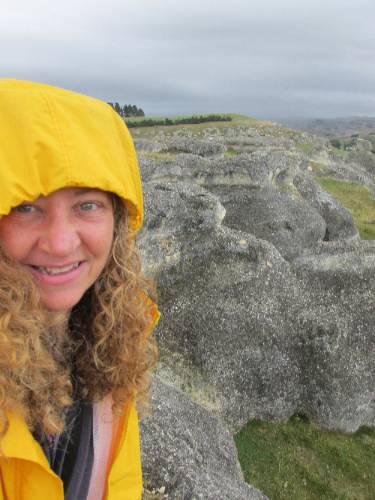Dr. Patricia Widener
Patricia Widener
Professor of Sociology
Phone: (954) 236-1079
Email:
pwidener@fau.edu
Office: DW408 (Davie)
Research: Climate, marine, and environmental justice; political economy of petroleum and the environment; social movements and transnational activism; and marine sociology
Teaching: Climate & environmental justice; environmental sociology; global environmental perspectives; poverty & society, and sociology of climate & disaster
Background
Patricia Widener is a professor of sociology and the author of two books: Toxic & Intoxicating Oil: Discovery, Resistance, and Justice in Aotearoa New Zealand (2021) and Oil Injustice: Resisting and Conceding a Pipeline in Ecuador (2011). She conducts allied ethnographic research and studies how communities and climate and environmental groups mobilize in response to an oil proposal, oil facility, or oil disaster. She examines community and oil industry conflict through the perspectives of climate, marine, and environmental justice, political economy, social movements, and visual sociology. Currently, she is analyzing data collected during dozens of resistance efforts in Southeast Florida against the policies and rhetoric of the 2017-2020 administration and she beginning to collect data on the impacts and experiences of climate change and COVID-19 on coastal and island communities.
Professor Widener teaches courses on poverty, global social change, environmental sociology, and the sociology of climate and disaster. She works with undergraduate students on independent research and inquiry projects and publishes with them on local climate change experiences. She frequently invites students to join her at various community and data-gathering events on issues related to the environment and climate change.
Monographs
Widener, P. 2021. Toxic and Intoxicating Oil: Discovery, Resistance, and Justice in Aotearoa New Zealand. New Brunswick NJ: Rutgers University Press.
Widener, P. 2011. Oil Injustice: Resisting and Conceding a Pipeline in Ecuador. Lanham MD: Rowman & Littlefield.
Selected Journal Articles and Book Chapters
Widener, P. 2020. “The Visual Opportunity Spaces of Oil: In Promotion, Protest, and Warning.” Visual Studies.
Widener, P. 2018. “National Discovery and Citizen Experts in Aotearoa New Zealand: Local and Global Narratives of Hydraulic Fracturing.” Extractive Industries & Society 5(4): 515-523.
Widener, P. 2018. “Coastal People Dispute Offshore Oil Exploration: Toward a Study of Embedded Seascapes, Submersible Knowledge, Sacrifice, and Marine Justice.” Environmental Sociology 4(4): 405-418.
Widener, P. and Carmen Rowe. 2018. “Climate Discourse: Eluding Literacy, Justice and Inclusion, By Evading Causation, Privilege and Diversity.” Environmental Sociology 4(1): 162-174.
Widener, P. 2018. “Citizens in Resistance to Oil Development and Acid Fracking in the Sunshine State.” Pp. 224-247 in Fractured Communities: Risk, Impacts, and Protest against Hydraulic Fracking in US Shale Regions, edited by Anthony Ladd. New Brunswick NJ: Rutgers University Press.
Karides, Marina and P. Widener. 2018. “Race, Class, Privilege and Bias in South Florida Food Movement.” Pp. 191-203 in Food & Poverty: Food Insecurity and Food Sovereignty among America’s Poor, edited by Leslie Hossfeld, E. Brooke Kelly, and Julia Waity. Nashville TN: Vanderbilt University Press.
Widener, P. 2016. “E-Fears, E-Risks and Citizen-Intelligence: The Impacts of Surveillance on Resistance and Research.” Surveillance & Society 14(2): 277-285.
Widener, P., Carmen Rowe, Ana Marie Estrada, Marcella Ahumada, Martha Eichloff and Jacquelyn Anderson. 2016. “Climate Action and Literacy through Creativity and Conversations.” Pp. 125-138 in Systemic Crises of Global Climate Change: Intersections of Race, Class and Gender, edited by Phoebe Godfrey and Denise Torres. NY: Routledge.
Widener, P. and Marina Karides. 2014. “Food System Literacy: Empowering Citizens and Consumers beyond Farm-to-Fork Pathways.” Food, Culture & Society 17(4): 665-687.
Widener, P. 2013. “A Protracted Age of Oil: Pipelines, Refineries and Quiet Conflict.” Local Environment: The International Journal of Justice and Sustainability 18(7): 834-851.
Widener, P. 2009. “Oil Tourism: Disasters and Destinations in Ecuador and the Philippines.” Sociological Inquiry 79(3): 266-288.
Widener, P. 2009. “Global Links and Environmental Flows: Oil Disputes in Ecuador.” Global Environmental Politics 9(1): 31-57.
Widener, P. 2007. “Benefits and Burdens of Transnational Campaigns: A Comparison of Four Oil Struggles in Ecuador.” Mobilization: An International Quarterly 12(1): 21-36.
Widener, P. and Valerie Gunter. 2007. “Oil Spill Recovery in the Media: Missing an Alaska Native Perspective.” Society and Natural Resources 20(9): 767-783.
Widener, P. 2007. “Oil Conflict in Ecuador: A Photographic Essay.” Organization & Environment 20(1): 84-105.
